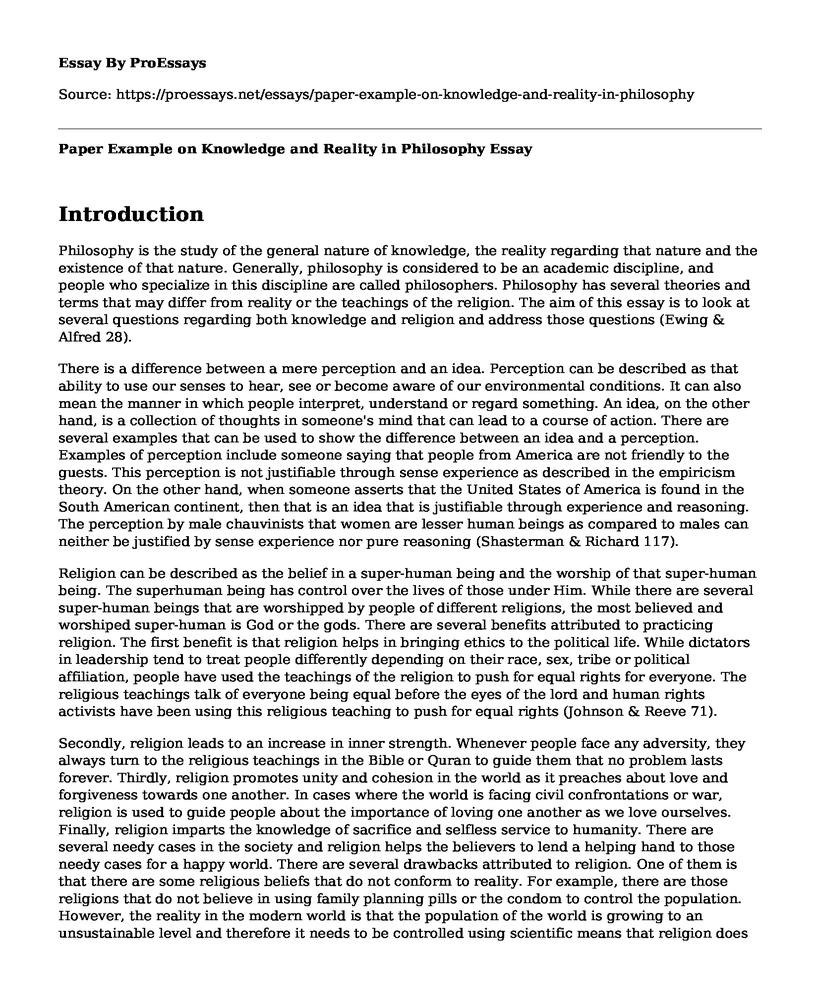Introduction
Philosophy is the study of the general nature of knowledge, the reality regarding that nature and the existence of that nature. Generally, philosophy is considered to be an academic discipline, and people who specialize in this discipline are called philosophers. Philosophy has several theories and terms that may differ from reality or the teachings of the religion. The aim of this essay is to look at several questions regarding both knowledge and religion and address those questions (Ewing & Alfred 28).
There is a difference between a mere perception and an idea. Perception can be described as that ability to use our senses to hear, see or become aware of our environmental conditions. It can also mean the manner in which people interpret, understand or regard something. An idea, on the other hand, is a collection of thoughts in someone's mind that can lead to a course of action. There are several examples that can be used to show the difference between an idea and a perception. Examples of perception include someone saying that people from America are not friendly to the guests. This perception is not justifiable through sense experience as described in the empiricism theory. On the other hand, when someone asserts that the United States of America is found in the South American continent, then that is an idea that is justifiable through experience and reasoning. The perception by male chauvinists that women are lesser human beings as compared to males can neither be justified by sense experience nor pure reasoning (Shasterman & Richard 117).
Religion can be described as the belief in a super-human being and the worship of that super-human being. The superhuman being has control over the lives of those under Him. While there are several super-human beings that are worshipped by people of different religions, the most believed and worshiped super-human is God or the gods. There are several benefits attributed to practicing religion. The first benefit is that religion helps in bringing ethics to the political life. While dictators in leadership tend to treat people differently depending on their race, sex, tribe or political affiliation, people have used the teachings of the religion to push for equal rights for everyone. The religious teachings talk of everyone being equal before the eyes of the lord and human rights activists have been using this religious teaching to push for equal rights (Johnson & Reeve 71).
Secondly, religion leads to an increase in inner strength. Whenever people face any adversity, they always turn to the religious teachings in the Bible or Quran to guide them that no problem lasts forever. Thirdly, religion promotes unity and cohesion in the world as it preaches about love and forgiveness towards one another. In cases where the world is facing civil confrontations or war, religion is used to guide people about the importance of loving one another as we love ourselves. Finally, religion imparts the knowledge of sacrifice and selfless service to humanity. There are several needy cases in the society and religion helps the believers to lend a helping hand to those needy cases for a happy world. There are several drawbacks attributed to religion. One of them is that there are some religious beliefs that do not conform to reality. For example, there are those religions that do not believe in using family planning pills or the condom to control the population. However, the reality in the modern world is that the population of the world is growing to an unsustainable level and therefore it needs to be controlled using scientific means that religion does not allow. This is a drawback that needs to be addressed to conform to the current tough economic times (Oman & Doug 30).
Works Cited
Ewing, Alfred C. The Fundamental Questions of Philosophy (Routledge Revivals). Routledge, 2013.
Johnson, D. P., and Zoey Reeve. "The virtues of intolerance: Is religion an adaptation for war?." Religion, intolerance, and conflict: A scientific and conceptual investigation (2013): 67-87.
Oman, Doug. "Defining religion and spirituality." Handbook of the psychology of religion and Spirituality 2 (2013): 23-47.
Shusterman, Richard. Practicing philosophy: Pragmatism and the philosophical life. Routledge, 2016.
Cite this page
Paper Example on Knowledge and Reality in Philosophy. (2022, Jul 01). Retrieved from https://proessays.net/essays/paper-example-on-knowledge-and-reality-in-philosophy
If you are the original author of this essay and no longer wish to have it published on the ProEssays website, please click below to request its removal:
- Hume Moral Judgments and Self-Love Theories Essay
- Delivering Negative News Essay
- Essay Example on Ethics for Life
- Moral Integrity in International Organisations Paper Example
- Aristotle's Tragic Hero: Flawed but Godly Character - Essay Sample
- Bar Ethics: Conflict of Interest & More - Essay Sample
- Paper Example on Effect of Physical Activity on Young People's Depression: A Meta-Analysis







